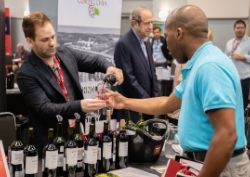Blog
Insights
In Talks with Wine & Bev Director at Cohn Restaurant Group

Meet Maurice DiMarino, Wine and Beverage Director at Cohn Restaurant Group.
Private Label has been a growing sector in the wine industry and is only expanding more and more. Retail chains, bars, and even high-end restaurants are creating their own private labels to offer their customers something unique and different.
In conversation with Anna, Editor in Chief at IBWSS is Maurice DiMarino. Maurice has been the Wine and Beverage Director at the Cohn Restaurant Group for over six years and counting.
Anna and Maurice chat over the world of private label wines, why Maurice picked private label wines for Cohn Restaurants, and Maurice also shares his tips for people wanting to build their own private label brand.
1. Could you tell me a little bit about what you exactly do?
So I’m the beverage director for the Cohn Restaurant Group. The Cohn Group is a regional restaurant group with various concepts, with 26 restaurants across California, and 2 in Hawaii. Over there I’m, well you can say a sommelier, cicerone, and educator. I’m also involved in curating and picking wines and programmes for the restaurant as our restaurants.
2. So why private labels? What made you start working with and as a private label?
One reason why I do private labels is that we have 28 different restaurants with different concepts, so trying to put together something for different concepts is a little difficult. The first reason is the cost, so I have a wine which is sold by the glass and it’s a low-cost wine and it makes us money. Another reason is the concepts. We have different concepts and we want to do a private label for them, like for our French Mediterranean restaurants, to bring a more French style blend. So just a concept that is unique to that restaurant. So all in all, it’s either to provide quality wine to make good profit, or to provide something unique for customers.
3. Could you share with me a little bit about your private label projects?
We do different private labels. One of them is a pinot grigio from Italy, which is sold by the glass and no one is really going to ask about a pinot grigio label so it’s always one of the most selling in our restaurants by the glass.
We also have a wine that we do out of Mexico in Baja, which is simply for the uniqueness of the wine. One of the reasons for this is that we’re based in San Diego, so there’s a big influence of Baja wine. It’s not very big in the nation yet but in our region it is and no one is doing Baja wine direct from Baja. So we bring our buyers down there, we do barrel blending, we select from barrels.
We have one which we’re doing for the experiential benefits for the company, for our staff. This is where I bring my buyers, my bartenders, and my servers with me and we go to the vineyards in San Diego county and we source rosé. We stop, we crush, we harvest, they do the entire harvest, we do the blending and it becomes a story that they can tell to the guests and it’s also a great team bonding for us.
4. What’s your take on the packaging? Does the packaging of wine matter?
It’s very important. Even though in the restaurant scene a lot of times customers don’t end up seeing the bottles, but we still promote them on social media and customers see them there and at times they end up deciding the wine they want because of the packaging they saw on social media.
In fact, I’ve done seminars with winemakers about wine packaging and how important it is - whether it’s going to be on retail shelves or in restaurants.
5. In the restaurant scene, is the story of the label important?
It is definitely important, but it isn’t the most driving force there is. We have tech sheets for our staff with all the information, but people don’t really ask unless they know it’s a private label or a unique wine.

6. What about pricing? How do you price private label wines to suffice different customers?
For us, it’s all about figuring out where we want to make our profit. For example, because of what we are doing with the Pinot Grigio wines, the quality is high, but we also want to make a profit on that - so our Pinot Grigio is on a by-the-glass programme, which we have a high-profit margin for. Now comparing it to the red blends from Baha, it’s more of a story, and it’s unique so I generally tend to keep the prices low for that as I want to make people taste it, and I want them to venture into new wines - so it’s not about making a profit, it’s all about introducing a new wine to customers and making them fall in love with it.
7. What’s one piece of advice you'd give to a restaurant wanting to enter into private labels?
The first thing I would tell them is to define your goal. What do you want from the wine? Is it purely for profit? Or are you looking to offer something unique to offer your customers? Based on this, it’s best to find fruit sources and wine sources that fit your goals and ideas.
One more thing to keep in mind is that it’s very important to have a strong idea of what kind of fruit and wine you want. There are loads of wines and fruit in the market, so if you don’t know what you want, then you’re going to be completely confused. So in the end, I think the best advice I can give is for them to decide what they want first and have a stronghold on that before going ahead with labelling and advertising.
8. Tell me a little about what you like drinking?
I’ve been into mezcal more than anything lately. When it comes to wine, I’m more of a white wine guy. I like dry rieslings. I don’t usually stick to one thing, however, I’m not into a lot of reds.
The private label category is growing immensely in the US. Click here to delve a little more into the world of private labels.
If you're a bulk wine or bulk spirits supplier, contract bottler, or private label producer aiming to connect with serious trade buyers, IBWSS San Francisco is the event you can't afford to miss. Get a quotation or Book a exhibitor table.

